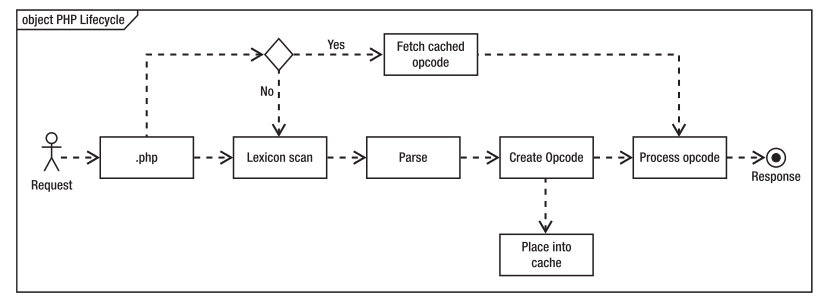What is the opcode cache? Modern operating code register (Optimizer+, APC2.0+, others) the use of shared memory to store, and can be directly executable from it, instead of before execution to deserialize the &rdquo code; &ldquo. This will bring significant performance acceleration, usually reduces the overall memory consumption of server, and few defects.
Why use Opcode cache?
The Zend engine has to read a file from the file system, scanning the dictionary and expression, parse the file, create to perform computer code (called Opcode), the implementation of Opcode. Every time the request PHP scripts are executed over the steps above, if the PHP source code does not change, then the Opcode will not change, obviously there is no need to each re generation of Opcode, combined with the omnipresent caching mechanism in Web, we can put the Opcode cache down, to directly access the cached Opcode isn't faster, process Fig. after enabling Opcode cache is shown as follows:
The PHP opcode cache plug-in?
PHP opcode principle: <?php echo "Hello World"; $a =1+1; echo $a;?> PHP this code is executed by the following 4 steps (should be PHP language engine Zend specifically,) 1.Scanning(Lexing),WillPHPCode conversion of language fragments(Tokens)2.Parsing,WillTokensExpression into a simple but meaningful3.Compilation,To compile the expression intoOpocdes4.Execution,Sequential executionOpcodes, Each one, in order to achievePHPThe script functions. Digression: now some Cache such as APC, allows the PHP to cache Opcodes, in this way, each time a request arrives, you do not need to repeat the previous 3 steps, which can greatly improve the execution speed of PHP. What is the Lexing? To learn the students of compiler theory should be the principle of compiler lexical analysis steps to understand somewhat, table based on Lex is a lexical analysis. Zend/zend_language_scanner.c based on Zend/zend_language_scanner.l (Lex file), to enter the PHP code for lexical analysis, so as to get a “ ”, PHP4.2 provides a function called token_get_all, this function can speak a PHP code Scanning into Tokens, If we mentioned at the beginning of the PHP code using this function, the following will result in:
Array([0]=>Array([0]=>367[1]=>Array([0]=>316[1]=> echo
)[2]=>Array([0]=>370[1]=>)[3]=>Array([0]=>315[1]=>"Hello World")[4]=>;[5]=>Array([0]=>370[1]=>)[6]=>=[7]=>Array([0]=>370[1]=>)[8]=>Array([0]=>305[1]=>1)[9]=>Array([0]=>370[1]=>)[10]=>+[11]=>Array([0]=>370[1]=>)[12]=>Array([0]=>305[1]=>1)[13]=>;[14]=>Array([0]=>370[1]=>)[15]=>Array([0]=>316[1]=> echo
)[16]=>Array([0]=>370[1]=>)[17]=>;)
Analysis of this result we can find, string, source of the character, the space, will return as is. Each source code of the character, will appear in the appropriate order. However, others such as label, operator, statement, will be converted to a Array: Token ID contains two parts (i.e. within the Zend codes, such as T_ECHO, Token, T_STRING), and the source of the original content. 1.echo a constant string 2.add two numbers together 3.store the result of the prior expression to a variable 4.echo a variable Then change to Compilation stage, it will compile Tokens into a op_array, each op_arrayd contains 5 parts as follows: 1.OpcodeDigital identification, points out eachop_arrayThe type of operation, for exampleadd , echo 2.ResultDepositOpcodeResult3.Operand1GiveOpcodeOperand4.Operand25.Extension value1Plastic is used to distinguish over loaded operators For example, our PHP code will be Parsing: * ZEND_ECHO 'Hello World'* ZEND_ADD ~011* ZEND_ASSIGN !0~0* ZEND_ECHO !0 You may ask, we $a go there? This will introduce the operands, each operand is composed of the following two parts: a)op_type :For theIS_CONST, IS_TMP_VAR, IS_VAR, IS_UNUSED, or IS_CV b)u,A joint body, according to theop_typeDifferent, using different types of saved the operand value(const)Or an lvalue(var) For VaR, each VaR is not the same IS_TMP_VAR, As the name suggests, this is a temporary variable, save some op_array results, so that the next op_array use, the operand u holds a pointer to the variable table a handle (integer), the operand is generally used. At the beginning, such as ~0, said temporary variables table 0 unknown IS_VAR this is our general sense of variables, they begin with a $ IS_CV said a cache ZE2.1/PHP5.1 compiler uses, this variable holds the address of the variable is that it refers to, when a variable is first referenced, CV will be up, to reference the variables do not need to find the active symbol table again, CV variables to! At the beginning of that. |


